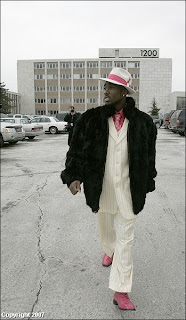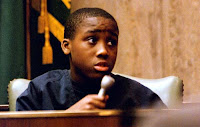The Welfare Queen Redux

As I returned to my state of Michigan a few weeks ago, I was greeted with the image of a dark skinned man sporting a fedora tipped to the side with a magenta shirt, and a white striped suit strolling out of the courthouse. In a matter of moments, for better or for worse, I knew I was home. As I visited my favorite Internet sites, I saw the image of Nathaniel Abraham splattered around. Abraham’s flamboyance in dress attracted heavy media attention, but just 8 years ago his use of shotgun grabbed national attention. As I turned on the news, video of him strolling in the parking lot in his suit was accompanied by voice overs discussing how residents were up in arms that Abraham was going free and would live in an apartment and attend college on the state’s dime. It was almost as if I could her the music entering as the news described the scary welfare queen in redux, this time only in the form of the cold blooded Black male killer. Let me make this clear up front, this piece is not about supporting Nathaniel Abraham’s killing, nor his dress, nor anything of that sort. This piece is about understanding what Nathaniel Abraham means to us and what he should represent to us, not what we’ve come to represent him as.
The heresy with which Michigan residents were disgusted by the prospect of Abraham being eligible for programs designed for abandoned youth, is the same disgust they should have felt when he was tried as an adult. It is the same disgust that we should hold when young men and women of color are released back into a society with few social supports. To me, it’s not a mystery that when a person, is isolated from social opportunities from childhood, and then you force them to “participate” fully there will be issues. As the old adage goes, “you gotta crawl before you ball.” Spending nearly half your life in prison cannot prepare you to succeed outside of prison. As the cameras snapped images of a man in outlandish attire, I could only see a manchild.
Recently when I was spending time with my little brother who is 11 and we began talking about independence and what his mother let’s him do. A typical conversation among pre-teens. As we talked, eventually we ended up telling him the story of Nathaniel Abraham, he looked on in shock and disbelief. My little brother is smart, top of his class, has his “head on straight” and I quickly realized the idea of leaving society and returning in 9 years was unimaginable. He, probably like most 11 year olds, found the prospect hard to swallow. As we talked more he repeatedly asked me questions like, “What happened to Nathaniel?” “Why’d he do (the murder) what he did?” These were difficult questions to answer. I still cannot fully answer them, but even my inability to answer speaks volumes.
I wonder about Nathaniel, not simply because he’s a human, but because I wonder what kind of world produces a manchild like him. I remember reading Fox Butterfield’s account of Willie Bosket and thinking that he told part of the story. Though I may not be able to retrace Nathaniel’s life, I’m sure there are more than enough elements that would trouble us. While the national cameras usually fixate on Detroit as a city in decline or post decline, seldom do people think of Pontiac. Pontiac, which sits not far from Detroit, is just as ripe with social ills and dangers: high amounts of crime, drugs, unemployment, and single headed households. While we all love the stories of “beating the odds” and want to highlight the exceptions to the rules of poverty, these stories are in many ways disingenuous. I think Nathaniel represents the rule, the rule that we need to grapple with, simply put: Your chances for success (however you define it) are severely limited (if not eliminated) if you grow up poor, Black, and male in America.
As the media spins images of Nathaniel “pimping the system” and people grow concerned that a “monster” lives on state support, we still have to ask, what/who created this “monster”? In reality, we all did. When we neglect and ignore the conditions of the youth, particularly poor and Black youth, we are assured that Nathaniel will not be the last Nathaniel. When there is bipartisan support for cutting social programs, we assure the development of the manchild. When we assume that things “aren’t that bad” because we can see downtown Detroit open a few shops, we ink poor children’s fates. Unfortunately, there will be more Nathaniels, people locked away with little ability to transition back into “society.” So the next time you hear of them getting “social support” before you ask “How could this happen?” you should ask “How did this happen?” In my estimation, his apartment and some tuition are a pittance compared to the life that we allowed Nathaniel to live before. Lastly, ask yourself, if you were Nathaniel, could you live up to the request of Judge Eugene Moore, “Show us all that you have become a caring, productive member of society”, without assistance.
Filed under: Black Men, Prison, Public Policy, Sociology




Pingback: Tweets that mention The Welfare Queen Redux - Uptown Notes -- Topsy.com()